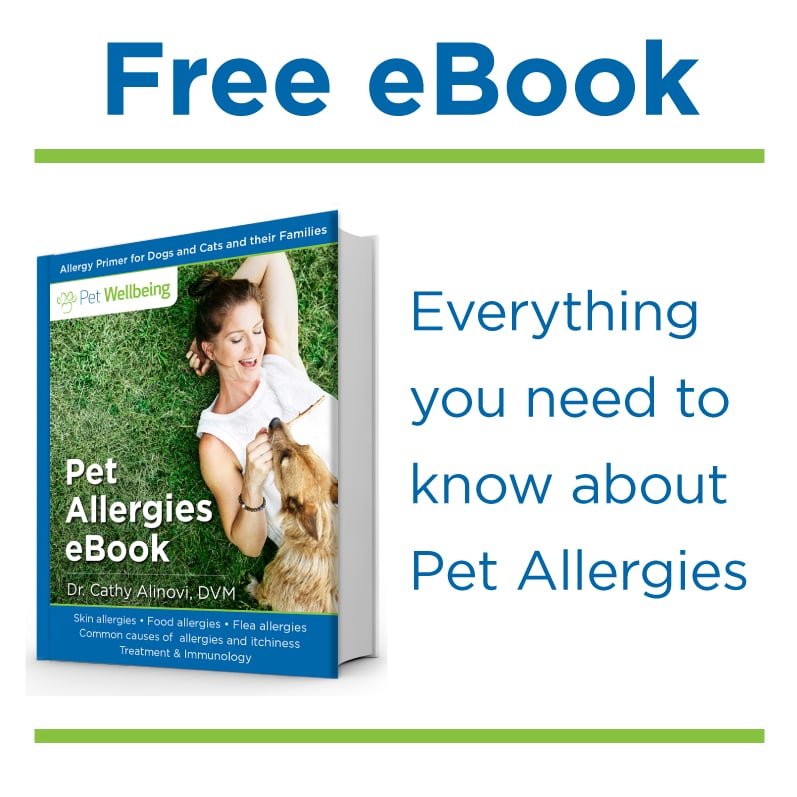
Natural Remedies for Allergies in Dogs and Cats
Pet Herbal Therapy with Natural Remedies
For caring owners who want the best for their pet, without the debilitating side effects and expensive fees of prescribed medicines, we've put together a list of safe and effective natural remedies for allergies in dogs and cats. These herbal therapies strengthen and treat your pets' immune system. Thousands of pet owners see amazing results with our natural herbal remedies such as Milk Thistle (liver health), Nettle-Eyebright for cat and dog allergies, as well as Immune Sure blend with Vitamin C - Pet Wellbeing's holistic support for increased immune strength for prevention.
However, if your pet presents symptoms of allergies, treating it with just the Immuno Sure, for example, may not be the best solution, although it may seem like an obvious remedy. This is why we have created a free Ebook on common Pet Allergies: symptoms, treatment and prevention; (download your copy below) Pet Immunity is a vital area of study which ever pet owner must understand before treating pet allergies or severe itchiness.
Western Herbal Therapy in treating Pet Allergy Symptoms:
In our eBook on Pet Allergies, we've covered a list of remedies commonly used as part of Western Herbal Therapy. During the early development stages of new pharmaceutical drugs, researchers often investigate mechanisms of action of traditional herbal medications and formulas. Consequently, a side benefit to the development of patent medicines is increased knowledge regarding the efficacy and function of herbs and constituent vitamins.
The body of knowledge regarding natural medications for allergies is quite large. Here is a listing with a short synopsis of the action of each.
Natural Remedies to Aid in Treatment of Allergy Symptoms:
- Apple Cider Vinegar - Stimulates immune system, raises pH, alkalinize
- Betaine HCl - Increases stomach acid to lower pH, helps GALT
- Bromelain - Reduces allergic stimulation
- Calcium - Reduces clinical signs of asthma
- Charcoalized bamboo and Chlorella - Heavy metal detoxification
- DMG/ Vitamin B15 (AKA Pangamite) - Adaptogen; works cofactors to counteract effects of stress, promote healing, modulates the immune system, aids in liver detox, helps prevent free radical damage, aids allergies, itch and asthma
- Dong quai (Angelica sinensis) - Used as an antihistamine and anti-inflammatory
- Eyebright (Euphrasia spp.) - Reduces congestion and secretions. It is good for itchy eyes, sneezing, and excess mucus.
- Fulvic/Humic acid - Boosts immune system
- Ginkgo (Ginkgo biloba) - Contains bioflavonoids and is used as an antioxidant and anti-inflammatory
- Histoplex - Natural antihistamine
- Histoplex AB - Natural antihistamine targeting airborne allergies
- Local Honey - Contains bee pollen from local plants causing hay fever and can help counteract allergy to those pollens, immunomodulation
- Milk thistle (Silybum marianum) - Helps reduce allergic, inflammatory, and histaminic reactions; supports liver function
- Nettle or Stinging Nettle (Urtica dioica) - Used as an antihistamine and anti-inflammatory
- Plant sterols - Modulate immune system
- Probiotics - Populate intestines with beneficial bacteria, better food digestion, less allergenicity, beneficial for immune system
- Quercetin - Stabilizes cell membrane of mast cells and eosinophils
- Red clover (Trifolium pratense) - Helps build the body’s resistance to allergies
- Rhodiola (Rhodiola rosea) - Regulates immune system, adaptogen
- L-Theanine - An amino acid to help calm the nervous system
- Turmeric (Curcuma longa) - Anti-inflammatory
- Vitamin A - Builds intestinal immune tolerance, decreases signs of asthma
- Vitamin B - Reduces clinical signs of asthma, boosts immune system
- Vitamin C - Supports immune system, anti-histamine
- Vitamin D - Builds immune system, decreases signs of asthma
- Vitamin E - Reduces symptoms associated with atopy
- Wobenzyme® - Digestive enzyme, between meals can reduce itch; anti-inflammatory
- Yarrow (Achillea millefolium) - Reduces congestion and secretions
An important note about vitamins:
- Vitamins A, D, and E are all fat-soluble vitamins and can build up in the body if taken at high doses for a long period of time. These high levels will eventually become toxic to the body.
- Oftentimes, it’s best to use vitamins in a balanced combination, rather than giving mega-doses of any one supplement. Vitamins B and C are water-soluble, so any excess will be excreted through the urine; these are common to pulse in high concentrations during acute allergy flare-ups.
- Vitamin B often turns the urine to a darker yellow, and taken in the evening may cause restless sleep
Free eBook from the PetWellbeing.com team of experienced veterinarians, naturopaths and doctors with over 140 combined years of caring for animals.





